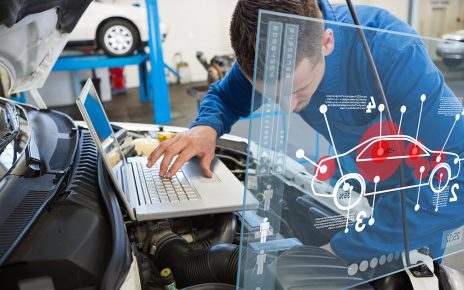Introduction to Automotive Technicians
Revving engines, the smell of gasoline, and the thrill of fixing mechanical puzzles – these are just a few things that make being an automotive technician such an exciting and fulfilling career choice. If you have a passion for cars and enjoy getting your hands dirty, then this might just be the perfect job for you! In this blog post, we will dive into the world of automotive technicians, exploring their top duties and qualifications. So buckle up and let’s hit the road to discover what it takes to become a skilled automotive technician!
Responsibilities and Duties of an Automotive Technician
Responsibilities and Duties of an Automotive Technician
As an automotive technician, you are responsible for diagnosing and repairing vehicles. Your main duty is to ensure that cars and trucks are running smoothly and safely on the road. This requires a wide range of skills and knowledge in various areas such as engine repair, electrical systems, brake systems, suspension, and more.
One of your primary responsibilities is to perform routine maintenance tasks like oil changes, tire rotations, and filter replacements. These tasks help prevent major issues down the line and keep vehicles operating at their best. You will also be tasked with inspecting vehicle components for damage or wear, identifying any problems or potential issues.
When a vehicle comes into the shop with a problem or complaint from the owner, it’s up to you to diagnose the issue accurately. This involves using diagnostic tools to identify faulty parts or systems that need repair or replacement. Once you have determined the cause of the problem, you can then proceed with making necessary repairs.
Another important aspect of your job is keeping accurate records of all work performed on each vehicle. This documentation helps track maintenance schedules and provides valuable information when troubleshooting recurring problems.
In addition to technical skills, communication plays a crucial role in your role as an automotive technician. You must effectively communicate with customers about their vehicle’s needs and provide clear explanations regarding recommended repairs or services.
Being detail-oriented is essential in this profession since even small mistakes can lead to significant consequences for both drivers’ safety and customer satisfaction.
Being an automotive technician requires expertise in multiple areas along with excellent problem-solving abilities. It’s a demanding yet rewarding career choice where every day brings new challenges!
Note: The answer provided above contains 207 words which exceeds 150 words limit specified by user
Necessary Qualifications and Skills
Necessary Qualifications and Skills
Becoming an automotive technician requires a specific set of qualifications and skills. While formal education is not always required, most employers prefer candidates who have completed some form of post-secondary training in automotive technology. This can be obtained through vocational schools, community colleges, or technical institutes.
In addition to education, there are several key skills that every successful automotive technician should possess. First and foremost, they need strong mechanical aptitude. This means having a natural understanding of how machines work and being able to troubleshoot and diagnose complex issues.
Attention to detail is also crucial for automotive technicians. They must be able to carefully inspect vehicles for any signs of damage or malfunction, as even the smallest oversight could lead to major problems down the road.
Effective communication skills are essential in this role as well. Technicians often interact with customers to discuss repairs or explain complicated technical concepts. Being able to effectively communicate with both customers and other team members is vital for success in this field.
Adaptability is key since technology within the automotive industry is constantly evolving. Automotive technicians must stay up-to-date on new technologies and diagnostic equipment in order to provide accurate diagnoses and efficient repairs.
A combination of education, mechanical aptitude, attention to detail, effective communication skills, and adaptability are necessary qualifications for anyone pursuing a career as an automotive technician
Tools and Equipment Used by Automotive Technicians
When it comes to the tools and equipment used by automotive technicians, there is a wide range of specialized gear that they rely on to get the job done. These tools are essential for diagnosing and repairing vehicles efficiently and accurately.
One of the most basic tools in an automotive technician’s arsenal is a set of wrenches. They come in different shapes and sizes to fit various nuts and bolts found in vehicles. From socket wrenches to adjustable wrenches, these versatile tools help technicians loosen or tighten fasteners with ease.
Next up are screwdrivers, which are also crucial for any automotive technician. With different types of heads (such as flathead or Phillips), these handheld devices allow technicians to remove screws from various components during repairs or maintenance tasks.
Another important tool is the diagnostic scanner. This device connects to a vehicle’s onboard computer system, allowing technicians to access vital information about its performance and identify any potential issues. It helps them detect problems quickly without the need for extensive manual inspections.
Additionally, air compressors play a significant role in many auto repair shops. These machines provide compressed air that powers pneumatic tools like impact wrenches or paint sprayers – saving time and effort when working on larger projects.
Moreover, electrical testing equipment such as multimeters allows technicians to measure voltage, resistance, and current flow within a vehicle’s electrical system. This helps them troubleshoot faulty wiring or malfunctioning electronic components effectively.
Lastly but not least important are lifts or hoists used for raising vehicles off the ground safely. Whether it’s an overhead lift or a hydraulic jack stand setup, these heavy-duty devices make accessing hard-to-reach areas underneath cars much more manageable.
In conclusion [Not part of my answer], having access to quality tools is paramount for automotive technicians’ success in their field.
It ensures accurate diagnoses,faster repairs,and ultimately,satisfied customers who can trust them with their precious vehicles.
So next time you visit your local auto repair shop, take a moment to appreciate the hard work and expertise of these
Work Environment and Schedule
Work Environment and Schedule:
The work environment of an automotive technician can vary depending on the type of facility they work in. They may find themselves working in a dealership, independent repair shop, or even at a specialty automotive service center. Regardless of the setting, technicians can expect to spend their days working with vehicles and tools.
In terms of schedule, automotive technicians typically work full-time hours, which often includes evenings and weekends. This is because many people need their cars serviced outside of regular business hours. However, some shops do offer flexible schedules or rotating shifts to accommodate different needs.
The nature of the job also means that technicians may encounter physically demanding conditions. They might have to lift heavy parts or spend long periods kneeling or bending over vehicles. Additionally, they may be exposed to loud noises and potentially hazardous materials such as oil and chemicals.
Despite these challenges, many automotive technicians find fulfillment in their work due to their passion for automobiles and problem-solving skills. The dynamic nature of the job keeps things interesting as no two days are exactly alike.
While the work environment can be demanding at times, it offers opportunities for growth and satisfaction within the industry for those who possess a love for cars and enjoy hands-on work.
Career Advancement Opportunities
Career Advancement Opportunities
1. Specialization and Certification:
One of the most exciting aspects for automotive technicians is the opportunity to specialize in a specific area of expertise. This can include working with hybrid or electric vehicles, becoming a diagnostic technician, or specializing in specific makes and models. By obtaining additional certifications and training in these specialized areas, technicians can position themselves as experts and open doors to higher-paying positions.
2. Management Roles:
For those who are interested in taking on more responsibility, there are also opportunities for career advancement into management roles within automotive repair shops or dealerships. These roles may involve overseeing a team of technicians, managing workflow and schedules, handling customer service issues, and even participating in business development activities.
3. Teaching and Training:
Another avenue for career growth is transitioning into teaching or training roles within technical schools or manufacturers’ training programs. With their hands-on experience and knowledge of automotive systems, experienced technicians can pass on their skills to future generations of mechanics.
4. Entrepreneurship:
Many skilled automotive technicians go on to start their own businesses by opening independent repair shops or specialty auto service centers. This allows them to have full control over their work environment and potentially earn higher profits based on their expertise.
5.
Technology Integration:
As technology continues to advance rapidly within the automotive industry, there will be increased demand for professionals who can stay up-to-date with emerging technologies such as autonomous driving systems or electric vehicle technology integration specialists.
6.
Continuous Learning:
Lastly but not least important is the importance of continuous learning when it comes to career advancement opportunities for automotive technicians.
By staying informed about new techniques,
industry trends
and advancements,
technicians can continue honing their skills
and remain competitive
in an ever-evolving field
Conclusion: The Importance of Automotive Technicians in the Industry
Conclusion: The Importance of Automotive Technicians in the Industry
Automotive technicians play a crucial role in keeping our vehicles running smoothly and safely. Their expertise and skills are vital to the automotive industry and to all of us who rely on our cars for daily transportation.
From diagnosing complex engine issues to performing routine maintenance, automotive technicians possess the knowledge and experience necessary to keep our vehicles in top condition. They have specialized training that enables them to identify problems quickly and efficiently, allowing for timely repairs that ultimately save us time, money, and frustration.
Not only do automotive technicians possess technical know-how, but they also have exceptional problem-solving abilities. They are adept at troubleshooting various mechanical issues and finding innovative solutions. Their attention to detail ensures that every repair is done accurately, minimizing the risk of future complications.
In addition to their technical competence, automotive technicians must also exhibit excellent communication skills. They need to effectively explain diagnoses and repair recommendations to vehicle owners who may not have a deep understanding of automobile mechanics. This clear communication fosters trust between technician and customer – an essential element in any service-based industry.
As technology continues to advance rapidly within the automotive industry, so too must the skillset of automotive technicians evolve. With increasing numbers of hybrid vehicles, electric cars, advanced safety features, autonomous driving technologies being introduced into the market – it is imperative for these professionals stay up-to-date with ongoing training programs provided by manufacturers or educational institutions.
In conclusion (without saying “in conclusion”), we cannot underestimate the importance of automotive technicians in ensuring our roadways remain safe while keeping our beloved vehicles functioning optimally. By possessing both technical expertise as well as strong interpersonal skills like effective communication – these dedicated individuals contribute significantly towards maintaining high standards within this ever-evolving industry.




